|
In This Issue...
- Post-Meeting Message from the President
- 27th Annual IBNS Conference at a Glance
- IBNS Conference: First Impressions
- Undergraduate Spotlight
- Trending Science
- 28th IBNS Conference and Upcoming Deadlines
- Member Obituary
Post-Meeting Message from the President
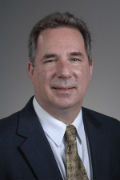
On July 2, 2018, the International Behavioral Neuroscience Society concluded its 27th Annual Meeting in beautiful Boca Raton, Florida. It was the second best-attended meeting in IBNS history, with 289 attendees. I wish to thank all of the people that contributed to such a successful meeting, but most especially: our keynote speakers, Tracy Bale, Jill Becker, Gregory Quirk, and Cheryl Sisk; the Program Committee, chaired by Elena Choleris and co-chaired by Farida Sohrabji; the Education Committee, chaired by Stacey Rizzo and co-chaired by Corina Bondi; and, of course, Marianne Van Wagner and Eve Van Wagner, for all they have done for this meeting and for IBNS. The Society would not exist without them. I would also like to thank all of our sponsors, but most especially our longest-standing and strongest supporter, Elsevier. I would also like to thank Noldus for sponsoring an excellent Behavioral Workshop on zebrafish methods. We hope to continue offering behavioral methods workshops in future meetings. I would like to also acknowledge the support of Plexon and Thorlabs, who helped support some additional travel awards for Puerto Rican students affected by Hurricane Maria. We had a record number of travel awards (29), so many in fact that I had trouble reading out all of the names at the banquet! Indeed, I missed one, Patricia de la Tremblaye (who is also our new Student Representative). Congratulations, once again, to all of the awardees including Kelly Lambert, winner of the Career Achievement Award, and Cindy Barha, winner of the Early Career Award.
Meeting attendees will also receive an email regarding two special issues that will be published with our official journals: Neuroscience and Biobehavioral Reviews (NBR), and Pharmacology Biochemistry and Behavior (PBB). In collaboration with NBR, we will publish a special issue based on the symposia presented at the annual meeting. In addition, this year we will publish a special issue of original papers in PBB, based on presentations at the meeting. The special issue will be open to all authors presenting original data at the meeting.
The Program Committee and the Local Organizing Committee are now making plans for our next meeting, in 2019 in Cairns, Australia. A call for symposium and satellite proposals has been published, so start considering topics for proposals, and please pass this call along to colleagues that you would like to hear speak at the 2019 meeting. More announcements will be coming soon about that meeting, but we encourage everyone to make plans early. I am sure that our Aussie colleagues will ensure that it is another very exciting and enjoyable IBNS conference.

F. Scott Hall, PhD
IBNS President
Back to Top
27th Annual IBNS Conference at a Glance
by Julianne Jett, PhD, Guest Editor
IBNS Membership & Communications Committee Chair
University of Texas at San Antonio, San Antonio, Texas
To echo the message from our IBNS President, Scott Hall, this year's meeting was one for the records! In total, 18 countries were represented: Australia, Canada, Costa Rica, Czech Republic, France, Germany, India, Ireland, Italy, Japan, Mexico, Saudi Arabia, South Africa, Spain, Switzerland, Taiwan, the United Kingdom, and the United States (to include Puerto Rico). Additionally, of the members in attendance, there were 26 postdoctoral attendees and 92 student attendees. The growing presence of trainees at the meeting results from the IBNS' continued commitment to mentoring young scientists, evident by the numerous professional development events woven into the program annually (e.g. Travel Awards Blitz, workshops, poster competition, etc.), and the friendly atmosphere that lends itself to networking.
Annually, IBNS also recognizes established professionals that have made a significant contribution to the Society and/or their field of study.* This year's Early Career Award recipient was Cindy Barha, in recognition of her noteworthy contributions to the field of behavioral neuroscience within seven years of receiving her doctorate degree. For their significant contributions to the Society and respective fields of study, this year's recipients of the Fellow Award were Jonathan Brigman, Jodi Pawluski, and Jill Silverman. Lastly, in recognition of her outstanding professional achievements in the field of behavioral neuroscience, Kelly Lambert received the Career Achievement Award.
These awards were presented alongside this year's winners of the poster, Twitter, photo, and costume competition at the end-of-meeting Awards Ceremony and Banquet. Congratulations again to all of our awardees and competition winners!
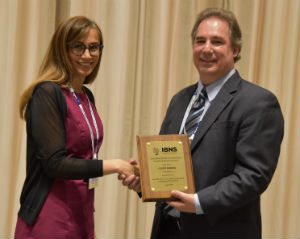 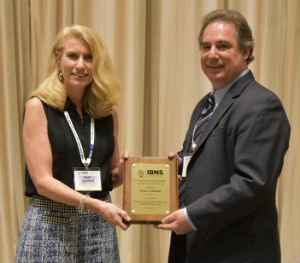
Best Poster Award: 2-Year Free Membership
Postdoctoral winner - Joshua Haight
Graduate winner - Christina Gobin
Undergraduate winner - Samantha Scarola
Best Tweet #IBNSconnect #IBNS2018: 1-Year Free Membership
Anand Gururajan
Photo Competition: $25 Cash
Robert Gerlai
Miami Vice Costume Competition: Free Registration at IBNS 2019
Stan Floresco
Stephen Kent
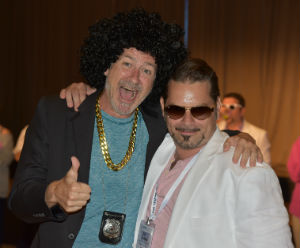
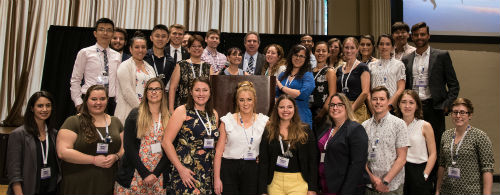
*For additional information regarding travel and professional awardees or award criteria, please visit the IBNS Awards page.
Back to Top
IBNS Conference: First Impressions
by Fernando Caravaggio, PhD, IBNS Postdoctoral Fellow
Institute of Medical Science at the University of Toronto, Toronto, ON, Canada
Conferences provide me with the opportunity to revitalize my passion for neuroscience. A good conference will remind me of all the reasons why I love the brain. From these meetings, I return home with notebooks filled with hastily scribbled research ideas, citations to read, and unanswered questions written on every page. From a great conference - like the IBNS 27th Annual Meeting - I return home not just revitalized, but with fond memories to last a lifetime.
For me, the most important part of neuroscience is the people: the neuroscientists. The IBNS 27th  Annual Meeting provided me with the opportunity to learn and engage with truly amazing people from all over the world. Thanks to the amazing networking events at the meeting, I was able to meet new colleagues and foster new, collaborative relationships. I even managed to celebrate both Canada Day and my birthday with my newfound colleagues! Importantly, the warm and supportive research environment at the meeting substantially improved my nerves during my blitz presentation. Annual Meeting provided me with the opportunity to learn and engage with truly amazing people from all over the world. Thanks to the amazing networking events at the meeting, I was able to meet new colleagues and foster new, collaborative relationships. I even managed to celebrate both Canada Day and my birthday with my newfound colleagues! Importantly, the warm and supportive research environment at the meeting substantially improved my nerves during my blitz presentation.
The IBNS 27th Annual Meeting stood out positively from other conferences I have attended in several important respects. First, the conference app (Whova) was fun and easy to use. It allowed everyone at the conference to stay connected and share their experiences. Second, the size and flow of the meeting was perfect (scientifically speaking, it was "the Goldilocks effect"). The meeting wasn't so large as to be overbearing and daunting. Great acrobatic finesse wasn't required to attend all the lectures, symposiums, and posters in tandem. However, the meeting was sufficiently large as to offer an impressive breadth and depth of topics. Finally, the calibre of research presented at the meeting was incredibly high (thanks to the inspired awards talk by Dr. Kelly Lambert, I now know what it means for the Snark to have been a Boojum).
I would like to sincerely thank the IBNS and everyone who made my first attendance at the meeting so special. I look forward to being reminded how much I love neuroscience at the 28th Annual Meeting in Queensland, Australia.
Back to Top
Looking for a new employment opportunity or struggling to find the right candidate? Meet the IBNS Career Center!
One of the biggest challenges for any international scientific society is to provide quality and informative support to its members, whether it is for a new employment opportunity or for finding the right candidate for a new position you opened. The IBNS excels in this area through its online Career Center portal (http://jobs.ibnsconnect.org) through which it provides the right tools for both, job seekers and employers.

The IBNS Career Center portal offers all the standard operational features, such as a thorough search engine by keyword and location, as well as extra services such as a free review of your resume for feedback and a job-posting service for employers. However, what makes the IBNS Career Center stand out in terms of support, is two additional quality features: resources for job seekers & access to a resume bank for employers.
In the Resources section you can have access to a number of articles with valuable tips in resume building, job seeking and communication, from experienced scientists in the field, not only for searching or applying for a position, but also for the interview process. There is also plenty of advice and tips for building your ‘brand’ and your social media presence, which will help you strengthen your image and moving your career to the direction you want.
 In the Resume Bank, potential employers have free access to a large bank of resumes and profiles, which you can customize by introducing filters that apply to your search and create lists of candidates that fulfill your own criteria. In the Resume Bank, potential employers have free access to a large bank of resumes and profiles, which you can customize by introducing filters that apply to your search and create lists of candidates that fulfill your own criteria.
Back to Top
Undergraduate Spotlight
by Julianne Jett, PhD, Guest Editor
IBNS Membership & Communications Committee Chair
University of Texas at San Antonio, San Antonio, Texas
 I have a confession to make. When I started attending IBNS as a graduate student, I had no idea that the Society offered financial and professional resources for undergraduate students. However, I have come to find out that I am not alone in this misconception. How do I know? Well, in part, IBNS offers annual undergraduate travel awards; yet, there are times in which no one applies. Perhaps, like me, undergraduates and their mentors are unaware of the valuable resources that IBNS has to offer. Or maybe mentors feel that their undergrads will get more "bang for their buck" professionally if they attend larger meetings. Personally, I have yet to find a society that is as trainee-focused or allows more networking with lead scientists than IBNS. But, you don't have to take my word for it. I touched based with some of our undergraduate student mentors and undergraduate student members to get their take on what IBNS has to offer to its youngest scientists. I have a confession to make. When I started attending IBNS as a graduate student, I had no idea that the Society offered financial and professional resources for undergraduate students. However, I have come to find out that I am not alone in this misconception. How do I know? Well, in part, IBNS offers annual undergraduate travel awards; yet, there are times in which no one applies. Perhaps, like me, undergraduates and their mentors are unaware of the valuable resources that IBNS has to offer. Or maybe mentors feel that their undergrads will get more "bang for their buck" professionally if they attend larger meetings. Personally, I have yet to find a society that is as trainee-focused or allows more networking with lead scientists than IBNS. But, you don't have to take my word for it. I touched based with some of our undergraduate student mentors and undergraduate student members to get their take on what IBNS has to offer to its youngest scientists.
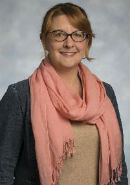 Kim Gerecke, PhD, Associate Professor of Behavioral Neuroscience Kim Gerecke, PhD, Associate Professor of Behavioral Neuroscience
Randolph-Macon College, Ashland, Virginia
IBNS is a wonderful venue for undergraduates to present their research. It's a welcoming, friendly society, where they get to talk and network with researchers in their field. Their posters are very well-attended, which is a real advantage compared to larger societies. Importantly, presentation of research at an international conference really sets them apart from many other applicants to graduate and medical schools. As well, I vividly remember presenting as a Master's student at IBNS, and that positive experience highly influenced my decision to renew my membership when I became a PI, and to bring my own undergraduate students to the conference.
Back to Top
 Kelly Lambert, PhD, Professor of Behavioral Neuroscience Kelly Lambert, PhD, Professor of Behavioral Neuroscience
University of Richmond, Richmond, Virginia
I have attended just about every IBNS meeting since its inception and I have had the opportunity to bring undergraduate students to most of those meetings. Whereas students can get lost in the crowd at larger scientific meetings, such as the Society for Neuroscience meeting, IBNS offers the perfect environment for undergraduate students. They meet accomplished neuroscientists during the coffee breaks and other activities such as the "Meet the Professionals" event and the students have the opportunity to take the stage themselves in the form of presenting posters and giving brief talks. Most of my students who have attended IBNS meetings have gone on to professional careers in either medicine or neuroscience, and their career decisions were influenced by their positive IBNS experience. Of course, being able to include a presentation at an international conference on their resumes or CVs make the students' applications more competitive and increases their chances of being accepted into graduate programs. Through the years, I have found the Society's interest in developing students to be genuine and sincere -- evidenced by considerable time and resources directed toward student travel awards, educational activities, and the dedication of part of the valuable scientific program to student presentations. Further, an impressive percentage of our annual meeting attendance is made up of students (undergraduate and graduate), and this is something that I feel the leadership of IBNS is most proud of -- we see that we are influencing the future of this discipline, and that's a great accomplishment and legacy for the future of behavioral neuroscience.
Back to Top
 Ben Tsang, 2018 Undergraduate Travel Awardee Ben Tsang, 2018 Undergraduate Travel Awardee
University of Toronto, Toronto, ON, Canada
Julianne: What is your area of research?
Ben: My research is focused on animal husbandry, effects of anxiolytics and anxiogenic drugs on zebrafish behaviour, and effects of environmental influences on zebrafish behaviour. I'm very lucky to have already authored/coauthored five published papers in these areas of research as an undergrad.
J: How has attending the IBNS meeting this year benefited you professionally?
B: Although IBNS was not my first meeting, it was still a great experience. I was asked to present at a Noldus workshop on zebrafish, at IBNS, which got me to think and describe our research in a way that allowed those who were not familiar with zebrafish to understand our methodologies.
J: Did you have a favorite symposium or event that you attended?
B: All the talks were wonderful, so I would have to say the banquet was the best!
J: What is the number one reason that undergraduates should attend IBNS?
B: If it's your first time attending a conference, IBNS is definitely a great place to go. It's not small, but it's not as large as something like SfN, which gives you a very family-like feel. Everyone gets to interact with one another and there's a bigger sense of community and support from everyone around you. Undergrads who enjoy an exciting experience + a wonderful location (Cairns, Australia, 2019) should definitely pursue the travel award. IBNS is a great way to meet new people and foster new connections.
Back to Top
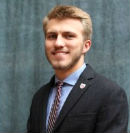 Dmitry Kovalev, 2018 Undergraduate Travel Awardee Dmitry Kovalev, 2018 Undergraduate Travel Awardee
University of Richmond, Richmond, Virginia
Julianne: What is your area of research?
Dmitry: I work in Dr. Kelly Lambert's lab and our lab focuses on experience-based neuroplasticity and resilience. My research interests include the subject of long-term behavioral and neurobiological outcomes following early-life adversity. Currently, I am working on a project exploring a preclinical animal model of the onset of depression-like symptoms following loss of environmental enrichment in rodents. We are interested in behavioral and neurological responses of animals to psychological loss. The model is aimed at stimulating the onset of depressive symptoms following psychological loss in humans. In addition, we are exploring in impact of coping styles on the emergence of depressive-like symptoms.
J: How has attending the IBNS meeting this year benefited you professionally?
D: Attending the IBNS meeting allowed me to familiarize myself with the cutting-edge research conducted in laboratories around the world. In addition, I was able to receive feedback on my project that allowed me to see parts of my experimental design and theory that could be improved.
J: Did you have a favorite symposium or event that you attended?
D: In my opinion, all of the symposia and events were extremely engaging and interesting. Each program session provided food for thought. However, two symposia that stood out to me the most were, Inflammation in psychiatric disorders: What we know and what is next and Optimizing brain performance: Identifying mechanisms of adaptive neurobiological mechanisms.
J: What is the number one reason that undergraduates should attend IBNS?
D: The number one reason for undergraduates to attend IBNS is the opportunity to learn more about behavioral neuroscience research being conducted across the world. Attending conferences and meeting researchers who have different perspectives is extremely important for an undergraduate engaging in research; it allows students to develop a broader perspective based on a variety of available data and findings. In a way, conferences such as IBNS further inspire an undergraduate to study the brain and behavior. Therefore, having an opportunity to attend such a conference has an enormous value for a developing scientist. For those undergraduates who have ongoing projects, I would suggest talking to their mentors in order to make a decision regarding submission of the application. This award is an amazing opportunity to attend a great conference and make both oral and poster presentations. The experience is tremendous, and I definitely recommend it to all undergraduates who are interested.
Back to Top
 Samantha Scarola, 2017 and 2018 Undergraduate Best Poster Awardee Samantha Scarola, 2017 and 2018 Undergraduate Best Poster Awardee
Randolph-Macon College, Ashland, Virginia
Julianne: What is your area of research?
Samantha: I worked in Dr. Kelly Lambert's lab my first year of research, but my last research experience was in collaboration with Dr. Massimo Bardi, and we are continuing to collaborate. My first research experience in neuroscience explored maternal behaviors, but I really fell in love with a field where both of my passions of neuroscience and medicine seem to meet -- neuroimmunology. Neuroimmunology is the area of research that I feel most passionate about and that I plan on continuing to explore throughout my medical career. This was the area of research that my most recent project, What the health: Investigating the immunomodulatory effects of stress and enrichment in Rattus norvegicus, fell under. I find that my ultimate goal is to conduct research that aids in giving us a better understanding of the body's innate abilities so that we may harness those natural abilities to give more effective and personalized care clinically.
J: How has attending the IBNS meeting this year benefited you professionally?
S: Attending IBNS has allowed me to network with some of the most well-known researchers in my field, and that is an invaluable experience. Being surrounded by such incredible minds and working side-by-side to achieve similar goals is a wonderful thing to have the opportunity to be a part of. IBNS meetings give me the opportunity to ask questions about not only specific research topics and content, but also about career opportunities and what it is like to pursue this field at a professional level.
J: Did you have a favorite symposium or event that you attended?
S: I am never disappointed by the symposia that I attend at the meetings, and there is always a wide variety of topics to choose from. This year, I particularly loved the symposium, Modifiable Risk Factors Contributing to Age-Related Memory Loss. I was very related to the work I plan on continuing throughout my own career path.
J: What is the number one reason that undergraduates should attend IBNS?
S: IBNS is a very close group of research professionals that will respect your research and give wonderful, encouraging feedback. After my two years of attending this meeting, I already feel like I belong and am welcome. This is a meeting where an undergraduate can learn and be inspired. After attending these meetings, I am given the confidence and insight needed to continue to pursue my research.
Back to Top
Trending Science
In this column, we share the latest research, interesting scientific articles and news.
New Insight on DAT's Role in Modulating Antipsychotic Drug Efficacy
by Julianne Jett, PhD, Guest Editor
IBNS Membership & Communications Committee Chair
University of Texas at San Antonio, San Antonio, Texas
Published in this month's edition of Molecular Psychiatry, IBNS member Davide Amato presented his research on mechanisms that underlie antipsychotic drug efficacy during short and prolonged treatment durations (Amato et al., 2018). Antipsychotic drug efficacy is commonly associated with dopamine D2 receptor blockade and has poor therapeutic outcome when administered for long durations or as a single dose. Dr. Amato and his colleagues found that D2 receptors are blocked even when antipsychotics have lost efficacy, thus suggesting that D2 receptor blockade might not be the primary therapeutic mechanism of antipsychotic drugs. The study also shows evidence that antipsychotic efficacy and failure is associated with changes in extracellular striatal dopamine levels rather than insufficient D2 receptor occupancy. These changes in extracellular striatal dopamine levels are presumably driven by modifications in dopamine transporter (DAT) expression and impairments of mechanisms modulating neurotransmitter release into the striatal synapse. his research on mechanisms that underlie antipsychotic drug efficacy during short and prolonged treatment durations (Amato et al., 2018). Antipsychotic drug efficacy is commonly associated with dopamine D2 receptor blockade and has poor therapeutic outcome when administered for long durations or as a single dose. Dr. Amato and his colleagues found that D2 receptors are blocked even when antipsychotics have lost efficacy, thus suggesting that D2 receptor blockade might not be the primary therapeutic mechanism of antipsychotic drugs. The study also shows evidence that antipsychotic efficacy and failure is associated with changes in extracellular striatal dopamine levels rather than insufficient D2 receptor occupancy. These changes in extracellular striatal dopamine levels are presumably driven by modifications in dopamine transporter (DAT) expression and impairments of mechanisms modulating neurotransmitter release into the striatal synapse.
The authors propose that DAT is a significant target for antipsychotic drug efficacy, and that DAT blockers may be an adjunct treatment for restoring therapeutic efficacy with prolonged antipsychotic treatment.
References: Amato, D., Canneva, F., Cuming, P., Maschauer, S., Groos, D., Dahlmanns, J.K., et al. (2018). A dopaminergic mechnism of antipsychtic drug efficacy, failure, and failure reversal: the role of the dopamine transporter. Mol Psychiatry. doi: 10.1038/s41380-018-0114-5. [Epub ahead of print]
Back to Top
28th Annual IBNS Conference and Upcoming Deadlines
Save the date for this must-attend event! June 23 - 27, 2018, the 28th Annual IBNS Meeting is in Cairns, Australia.
The IBNS Program Committee is now accepting symposium and satellite proposals. Members and non-members of IBNS are invited to submit proposals.
September 15, 2018: Symposia/Satellite Proposals Due
December 16, 2018: Travel Award Applications Due
February 1, 2019: Abstract Submissions Due (Oral/Poster)
June 23-27, 2019: Conference Dates
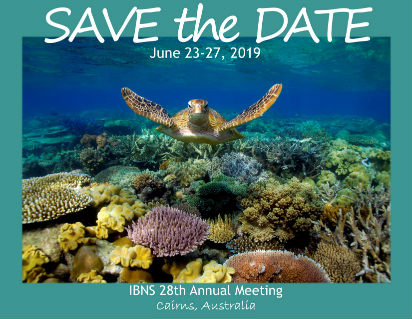
Be sure to keep checking the IBNS 2019 meeting page for frequent updates.
Back to Top
IBNS Member Obituary
It is with heavy hearts that we share the passing of IBNS Fellow, Timothy Schallert, PhD, on May 29, 2018. He was a Professor of Psychology and Neuroscience at the University of Texas at Austin, as well as Adjunct Professor of Neuroscience at the University of Michigan and Adjunct Research Scientist of Neurology at the Henry Ford Medical Center.
Dr. Schallert's research focused on the analysis of rat behavior and its application to models of stroke, Parkinson's disease, and spinal cord injury. A complete obituary with recognition of his scientific contributions can be found here.
Back to Top
Do you have an interesting hobby or member news to share?
Let us know at [email protected]
|